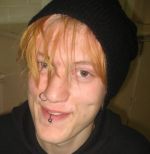To her neighbours in Littlehampton, Sarah Whitehead was a pleasant, if slightly dotty, former nurse. While surrounding homes in the West Sussex town were well-kept, the 52-year-old let her garden become overgrown — providing private sanctuary, she said, for all manner of unwanted pets, from guinea pigs to rescued dogs.
By day, the dark-haired woman was often seen out walking her dogs with a younger, blonde companion — her lesbian partner. By night, she was heard talking to her assorted animals in the garden.
‘She was always polite and would nod hello,’ says one neighbour. ‘We knew she kept loads of creatures in her back garden, but she really did try to keep herself to herself. She was a bit odd — but no odder than half the folk you meet.’
To add to the impression she gave of being a harmless, quintessentially English eccentric, she was also known by the nickname ‘Mumsy’ to her wide circle of young friends, who visited from around the country.
But all this was a cynical, well-rehearsed sham. For there was nothing remotely maternal about Sarah ‘Mumsy’ Whitehead.
From her home, where she used sophisticated computer technology to plan attacks, Whitehead was one of the key figures behind a shadowy group of animal rights fanatics who waged a campaign of terror against anyone connected — however tenuously — to any forms of testing on animals.
In a network that stretched from southern England to Europe and the U.S., Whitehead was part of an alliance of extremists who dug up human remains, smeared enemies as paedophiles and even targeted couriers and caterers supplying Home Office-licensed laboratories.
This weekend, as Whitehead begins a six-year jail sentence for the campaign of terror (and she is already complaining to prison officers about being made to wear leather shoes) the full details of her double life can be revealed for the first time.
Whitehead’s capture — along with the jailing of former tailor Greg Avery, another leading activist — has provided an unprecedented insight into the secret world of these fanatics, who for years have evaded arrest by operating in ‘cells’ and undergoing extensive training in how to avoid police surveillance.
‘They studied the structures of the IRA and also held regular training sessions at safe houses, where they were told how to spot undercover officers and ensure they weren’t being followed,’ says Andy Robins, the dog-loving detective who arrested Mumsy and her followers after a five-year undercover operation, codenamed Achilles.
‘Sarah Whitehead was a corrupting influence on younger members,’ adds Robins. ‘She was a mother figure to some of the others, hence the nickname. But she was also utterly committed to her cause.’
Jailed alongside Whitehead were other, younger members of the gang: Nicole Vosper, 22, Thomas Harris, 27, Jason Mullan, 32, and Nicola Tapping, 29. Alfie Fitzpatrick, a public schoolboy aged just 17 when he was recruited, was given a suspended sentence.
All the youngsters worked alongside Whitehead in Stop Huntingdon Animal Cruelty (SHAC), a seemingly respectable pressure group formed in 1999. SHAC volunteers even became a feature of the British High Street, where Whitehead and her fellow volunteers collected funds and tried to recruit new members.
Up and down the country, volunteers also distributed shocking pictures (later found, in fact, to include material from illegal labs in the Middle East) of alleged cruelty at Huntingdon Life Sciences, the subject of SHAC’s increasingly aggressive campaign.
Employing 16,000 people, Huntingdon is the largest private company involved in testing medicines and chemicals on animals, with its global headquarters in Cambridgeshire. The company says that its research breakthroughs have saved and enhanced the lives of countless human beings.
‘This is nothing to do with animal rights — this was a criminal conspiracy, involving blackmail and violence, designed to create a climate of fear among their victims.’
Publicly, Whitehead and other members of the group preached non-violent protests against Huntingdon. But privately, they were secretly plotting ‘operations’ — including fire-bombings and acid attacks — on all aspects of its business, with the aim of forcing it to close down.
The strategy was straightforward: any businesses with any connection to Huntingdon, including even sandwich delivery men and cleaning firms, were warned in telephone calls to sever all ties.
If the warnings went unheeded, anonymous letters were sent to the neighbours of these ordinary businessmen and women, warning that they were convicted paedophiles and could pose a threat to children.
Mud stuck. Some Huntingdon employees were forced to leave their homes. In what amounted to blackmail, the targets were offered a deal: stop working with Huntingdon and your name will be removed from websites and the attacks will stop. Facing ruin, many local businesses did just that.
The violence worked. SHAC was raising £3,000 a week in street donations alone, meaning Mumsy Whitehead and leaders of the group could be full-time activists.
Huntingdon was in meltdown, with staff leaving and suppliers refusing to deliver. The share price collapsed — from £300 in the 1990s to 3p in 2001.
(c) Daily Mail



